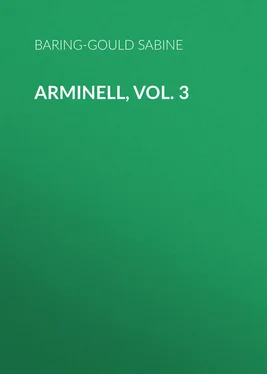Sabine Baring-Gould - Arminell, Vol. 3
Здесь есть возможность читать онлайн «Sabine Baring-Gould - Arminell, Vol. 3» — ознакомительный отрывок электронной книги совершенно бесплатно, а после прочтения отрывка купить полную версию. В некоторых случаях можно слушать аудио, скачать через торрент в формате fb2 и присутствует краткое содержание. Жанр: foreign_antique, foreign_prose, на английском языке. Описание произведения, (предисловие) а так же отзывы посетителей доступны на портале библиотеки ЛибКат.
- Название:Arminell, Vol. 3
- Автор:
- Жанр:
- Год:неизвестен
- ISBN:нет данных
- Рейтинг книги:5 / 5. Голосов: 1
-
Избранное:Добавить в избранное
- Отзывы:
-
Ваша оценка:
- 100
- 1
- 2
- 3
- 4
- 5
Arminell, Vol. 3: краткое содержание, описание и аннотация
Предлагаем к чтению аннотацию, описание, краткое содержание или предисловие (зависит от того, что написал сам автор книги «Arminell, Vol. 3»). Если вы не нашли необходимую информацию о книге — напишите в комментариях, мы постараемся отыскать её.
Arminell, Vol. 3 — читать онлайн ознакомительный отрывок
Ниже представлен текст книги, разбитый по страницам. Система сохранения места последней прочитанной страницы, позволяет с удобством читать онлайн бесплатно книгу «Arminell, Vol. 3», без необходимости каждый раз заново искать на чём Вы остановились. Поставьте закладку, и сможете в любой момент перейти на страницу, на которой закончили чтение.
Интервал:
Закладка:
In our Latin grammars we learned “Nemo omnibus horis sapit,” but that may be better rendered, “Quis non omnibus horis delirat?”
The anthropologist and antiquary delight in exploring the kitchen middens of a lost race, heaps of bones, and shells, and broken potsherds rejected by a population that lived in pre-historic times. But, oh, what kitchen middens are about our own selves, at our own doors, of empty shells and dismarrowed bones of old convictions, old superstitions, old conceits, old ambitions, old hopes! Where is the meat? Where the nutriment? Nowhere; gone past recall; only the dead husks, and shells, and bones, and potsherds remain. Open your desk, pull out the secret drawer, and what are revealed? A dry flower – the refuse scrap of an old passion; a worthless voucher of a bad investment; a MS. poem which was refused by every magazine; a mother’s Bible, monument of a dead belief. Go, turn over your own kitchen middens, and then come and argue with me that such a delusion as that of Captain Saltren is impossible. I tell you it is paralleled every year.
And now, sitting on the heap of stones, full of doubt, and yet not altogether a prey to despair, Captain Saltren took the red book again, and began to read it, first at the beginning, then turning to the middle, then looking to the end. Then he put it from him once more, and, with the cold sweat streaming over his face, he walked to the edge of the quarry, and there knelt down to pray. Had he been deceived? Was he not now subjected to a fiery trial of his faith – a last assault of the Evil One? This was indeed a possibility, and it was a possibility to which he clung desperately.
A little while ago we saw Giles Saltren humiliated and crushed, passing through the flame of disappointment and disenchantment, the purgatorial flame that in this life tries every man. In that fire the young man’s self-esteem and self-reliance had shrivelled up and been reduced to ash. And now his reputed father entered the same furnace.
He prayed and wrestled in spirit, wringing his hands, and with sweat and tears commingled streaming down his cheeks. He prayed that he might be given a token. He could not, he would not, accept the humiliation. He fought against it with all the powers of his soul and mind.
Then he stood up. He was resolved what to do. He would walk along the ledge of rock to the Owl’s Nest, holding the red book in his hand instead of clinging to the ivy bands. If that book stayed him up and sustained him in equilibrium till he reached the Cave, then he would still believe in his mission, and the revelations that attended it. But if he had erred, why then —
Holding the book he began the perilous walk. He took three steps forward, and then the judgment was pronounced.
CHAPTER XLI.
SOCIAL SUICIDE
When Giles Saltren had left town to return to Orleigh his uncle remained with Arminell. The girl asked Mr. Welsh to leave her for half an hour to collect her thoughts and resolve on what she would do; and he went off to the British Museum to look at the marbles till he considered she had been allowed sufficient time to decide her course, and then he returned to the inn. She was ready for him, composed, seated on the sofa, pale, and dark under the eyes.
“Well, Miss Inglett,” said Welsh, “I’ve been studying the busts of the Roman Emperors and their wives, and imagining them dressed in our nineteenth-century costume; and, upon my word, I believe they would pass for ordinary English men and women. I believe dress has much to do with the determination of character. Conceive of Domitian in a light, modern summer suit – in that he could not be bloodthirsty and a tyrant. Imagine me in a toga, and you may imagine me committing any monstrosity. Dress does it. How about your affairs? Are you going to Aunt Hermione?”
“To Lady Hermione Woodhead?” corrected Arminell, with a touch of haughtiness. “No.”
“Then what will you do? I’ll take the liberty of a chair.” He seated himself. “I can’t get their busts out of my head – however, go on.”
“Mr. Welsh, I wish to state to you exactly what I have done, and let you see how I am circumstanced. I have formed my own opinion as to what I must do, and I shall be glad afterwards to hear what you think of my determination. You have shown me kindness in coming here, and offering your help, and I am not so ungracious as to refuse to accept, to some extent, the help so readily offered.”
“I shall be proud, young lady.”
“Let me then proceed to tell you how stands the case, and then you will comprehend why I have taken my resolution. I ran away from home with your nephew, moved by a vague romantic dream, which, when I try to recall, partly escapes me, and appears to me now altogether absurd.”
“You were not dressed for the part,” threw in Welsh. “You could no more be the heroine in modern vest and the now fashionable hat, than I could commit the crimes of Cæsar in this suit.”
“In the first place,” pursued Arminell, disregarding the interruption, “I was filled with the spirit of unrest and discontent, which made me undervalue everything I had, and crave for and over-estimate everything I had not. With my mind ill at ease, I was ready to catch at whatever chance offered of escape from the vulgar round of daily life, and plunge into a new, heroic and exciting career. The chance came. Your nephew believed that he was my half-brother.”
“Young Jack-an-apes!” intercalated Welsh.
“That he was my dear father’s son by a former fictitious marriage with your sister Mrs. Saltren, I believed, as firmly as your nephew believed it; and I was extremely indignant with my poor father for what I thought was his dishonourable conduct in the matter, and for the hypocrisy of his after life. I thought that, if I ran away with your nephew, I would force him – I mean my lord – to acknowledge the tie, and so do an act of tardy justice to his son. Then, in the next place, I was filled with exalted ideas of what we ought to do in this world, that we were to be social knights errant, rambling about at our own free will, redressing wrongs, and I despised the sober virtues of my father, and the ordinary social duties, with the execution of which my step-mother filled up her life. I thought that a brilliant career was open to your nephew, and that I might take a share in it, that we would make ourselves names, and effect great things for the social regeneration of the age. It was all nonsense and moonshine. I see that clearly enough now. My wonder is that I did not see it before. But the step has been taken and cannot be recalled. I have broken with my family and with my class, I cannot ask to have links rewelded which I wilfully snapped, to be reinstalled in a place I deliberately vacated. Nemesis has overtaken me, and even the gods bow to Nemesis.”
“You are exaggerating,” interrupted Welsh; “you have, I admit, acted like a donkey – excuse the expression, no other is as forcible and as true – but I find no such irretrievable mischief done as you suppose. Fortunately the mistake has been corrected at once. If you will go home, or to Lady Woodhead – ”
“Lady Hermione Woodhead,” corrected Arminell.
“Or to Lady Hermione Woodhead – all will be well. What might have been a catastrophe is averted.”
“No,” answered Arminell, “all will not be well. Excuse me if I flatly contradict you. There is something else you have not reckoned on, but which I must take into my calculations. I shall never forget what I have done, never forgive myself for having embittered the last moments of my dear father’s life, never for having thought unworthily of him, and let him see that he had lost my esteem. If I were to return home, now or later from my aunt’s house, I could not shake off the sense of self-reproach, of self-loathing which I now feel. There is one way, and one way only, in which I can recover my self-respect and peace of mind.”
Читать дальшеИнтервал:
Закладка:
Похожие книги на «Arminell, Vol. 3»
Представляем Вашему вниманию похожие книги на «Arminell, Vol. 3» списком для выбора. Мы отобрали схожую по названию и смыслу литературу в надежде предоставить читателям больше вариантов отыскать новые, интересные, ещё непрочитанные произведения.
Обсуждение, отзывы о книге «Arminell, Vol. 3» и просто собственные мнения читателей. Оставьте ваши комментарии, напишите, что Вы думаете о произведении, его смысле или главных героях. Укажите что конкретно понравилось, а что нет, и почему Вы так считаете.












